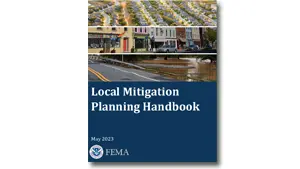 FEMA’s Local Mitigation Planning Handbook (Handbook) guides local governments, including special districts, as they develop or update a hazard mitigation plan.
FEMA’s Local Mitigation Planning Handbook (Handbook) guides local governments, including special districts, as they develop or update a hazard mitigation plan.
Mitigation planning provides a framework local governments can build on to lessen the impacts of natural disasters. By encouraging whole-community involvement, assessing risk and using a range of resources, local governments can reduce risk to people, economies and natural environments.
The Handbook is a companion to FEMA’s Local Mitigation Planning Policy Guide. The Guide helps local governments understand the requirements in the CFR. It also assists state and federal officials who provide training and technical assistance to local governments during their review and approval of local plans. The Handbook, on the other hand, gives advice and approaches for developing these plans.
The Handbook will:
- Help local governments meet the requirements in the Local Mitigation Planning Policy Guide and Title 44 of the Code of Federal Regulations (CFR) for FEMA approval. An approved, adopted mitigation plan is a gateway to apply for FEMA Hazard Mitigation Assistance (HMA) and High Hazard Potential Dam (HHPD) grant programs.
- Provide useful ideas and approaches that aid communities in reducing vulnerabilities and long-term risk from natural hazards and disasters through planning.
Click here to view the resource.




